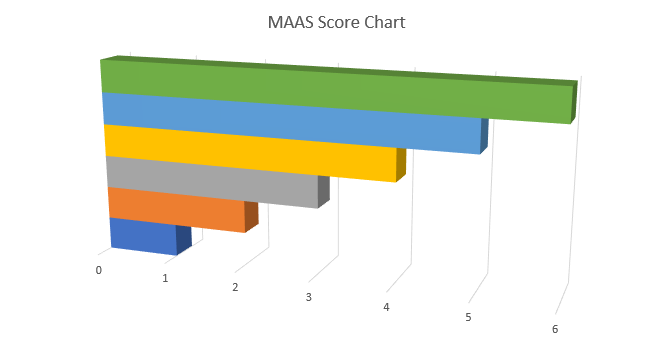Thank You For Taking The Quiz!
Check your Email for a copy of your assessment.
Assessing Trait Mindfulness
Mindfulness practices can lead us away from thought suppression and impulsivity. The combination of which can lead to an enormous list of stress issues. Mindfulness practices can counter these negative effects, ultimately helping us to feel a greater sense of life satisfaction with an increased overall physical, mental, and emotional health. This is the holistic path of the mind, body, spirit complex experience. Mindfulness may not be something most of us do easily or habitually, but it can be taught. It is a really positive and profound agent in learning to help us break out of our mode of operation that may not be the most useful to our health, or overall sense of wellbeing and peace, as said, or in getting us to where we would like to be in life.
Our ability to live mindfully may rely on our levels of trait mindfulness, which the MAAS test has shown to be useful in measuring below. If you would like a general idea of how well you are able to live in the present moment, consider taking this quiz. As in all self-assessment tools, they serve us best when we can answer each question with the uppermost of openness and sincerity. This can be very useful information to acquire that may help clarify some inner questions you may have had. Or it may help you develop new inquiries that may well serve your next steps on your life adventure.
HOW TO CALCULATE MAAS SCORE
To score the scale, simply compute a mean (average) of the 15 items.
Higher scores reflect higher levels of dispositional mindfulness.
EXAMPLE: IF YOUR TOTAL SCORE WAS = 84
84 (your score) ÷ 15 (# of questions) = 5.6

Higher numbers correspond to higher trait mindfulness. See the graph to help you conceptualize where you may fall. Ranges from highest, middle, and lowest are depicted correspondingly as 6, 3, & 1. Scores may range from 2.8-3 or less with no training, and 3.2 or more with some help in this field of discovery.
References:
Baer, R.A. (2003). Mindfulness training as a clinical intervention: A conceptual and empirical review. American Psychological Association. V10 N2, 125-143.
Hülsheger U. R. Alberts H. J. E. M. Feinholdt A. & Lang J. W. B. (n.d.). Benefits of mindfulness at work : the role of mindfulness in emotion regulation emotional exhaustion and job satisfaction. Journal of Applied Psychology 310–325.
Penn Arts and Sciences Positive Psychology Center. (2022, October 30). Mindful Attention Awareness Scale. https://ppc.sas.upenn.edu/resources/questionnaires-researchers/mindful-attention-awareness-scale
